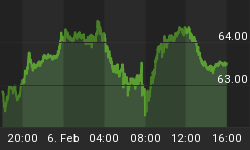Overall +0.0%, YoY +0.9%, Department Stores -2.2%
Economists were surprised by the dismal retail sales report this morning. That's not surprising because economists are nearly always surprised.
The Bloomberg Consensus retail sales estimate was a rise of 0.2%, but sales came in at 0.0% and the details were ugly, emphasis mine.
Consumer confidence may be strong but it still is not translating to strength for consumer spending. Retail sales were unchanged in April vs Econoday expectations for a 0.2 percent gain. Excluding autos, sales did rise but only barely at plus 0.1 and below expectations for 0.5 percent, while excluding both autos and gasoline, sales rose 0.2 percent vs expectations for a 0.4 percent gain.
The surprising part of the report isn't the weakness in motor vehicles, which was signaled by weak unit sales and which fell 0.4 percent in the month, but weakness in some of the core readings including department stores which fell a very steep 2.2 percent and electronics & appliances which fell 0.4 percent for a 7th straight decline. Both furniture and food & beverages also show declines.
Year-on-year rates show just how weak growth in the retail sector has been. Total retail sales are up only 0.9 percent year-on-year, down from 1.7 percent in March. This is the lowest rate since late 2009. Excluding motor vehicles, year-on-year sales are unchanged, again the lowest reading since late 2009. Ex-auto ex-gas, sales are up a respectable 3.4 percent but, compared to 3.9 percent in March, are going in the wrong direction.
Estimated Retail Sales
The Census Department offers this ![]() Table of Retail Sales.
Table of Retail Sales.
Note the huge patch of negative numbers this month. At least people are still eating out and drinking more.
Also note the negative numbers in the November 2014 through January 2015 column.
Economists expected the decline in gasoline sales (down 7.2%) to translate into increased sales elsewhere. It didn't.
I am scratching my head over Bloomberg's statement "consumer confidence may be strong ...". What the heck is Bloomberg talking about?
Does Bloomberg even read its own numbers? Here is a snip from the Bloomberg Consumer Confidence Level Report for April 2015, released on 4/28/2015.
Consumer confidence has fallen back noticeably this month, down more than 6 points to a much lower-than-expected 95.2. This compares very poorly with the Econoday consensus for 103.0 and is even far below the Econoday low estimate of 100.5. The weakness, ominously, is the result of falling assessments of the jobs market, both the current jobs market and expectations for the future jobs market. The second quarter, which is expected to be much stronger than the weather-depressed first quarter, isn't likely to get off to a fast start, at least as far as this report goes.
The most striking weakness in April is the assessment of future conditions with the expectations component down 8.5 points to 87.5 for the weakest reading going all the way back to September. And the most striking weakness among the sub-components is employment, where fewer see more jobs opening up 6 months from now and more see fewer jobs available. This spills over into income where fewer see an increase ahead and more see a decrease.
But also weak is the present situation component which is down more than 2-1/2 points to 106.8 for its weakest reading since December.
The Fed is not looking at those numbers either. In the latest FOMC report the Fed specifically stated "consumer sentiment remains high".
I mocked the Fed on April 29 in Fed Cites Weather, "Transitory" Factors in FOMC Statement; What About Consumer Sentiment?
Autos Only Reason YoY Sales Are Positive
Autos are now the only thing keeping retail sales positive year-over-year. And auto sales are driven by subprime loans. How long is this party going to last?
Who wants a car, needs a car, can afford a car, and can get a car loan?
Retail Sales Flashbacks
- January 14 - Economists Still Upbeat: Retail Sales Drop Seen as "Blip"
- February 13 - Economists Blame Weather: Retail Sales "Unexpectedly" Decline; December Revised Lower, GDP Estimates Follow.
- April 14 - Experts Confounded: Retail Sales Rise First Time in Four Months, But Weaker Than Expected.
Household Spending Growth Expectations Plunge; Recession Already Started?
Every month the Fed does a Survey of Consumer Expectations for inflation, earnings growth, income growth, and consumer spending growth.
Yesterday, I stuck my neck out regarding consumer spending projections: Household Spending Growth Expectations Plunge; Recession Already Started?
Downloading data from the Fed, I produced this chart.
This is what I said yesterday...
Spending AnalysisIn spite of rising earnings and income estimates, "median household spending growth expectations retreated significantly from the last month" in the Fed's words.
Should these spending projections prove to be correct, a US recession that few if any economists see coming, has already started.
The Fed's own survey shows spending sentiment is weak. The data shows how weak. Amusingly, the Fed says "consumer sentiment remains high".
And Bloomberg does not believe its own sentiment numbers either.
Following today's report, I move my position from a recession may have started to a recession is now likely underway.
I suspect economists and the Fed will still believe it's "transitory". If so, look for the term "technical recession" because no one seems to believe it. Heck, they do not even believe their own data.


















